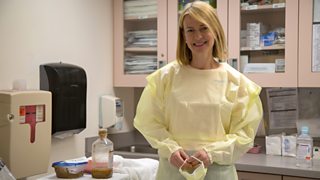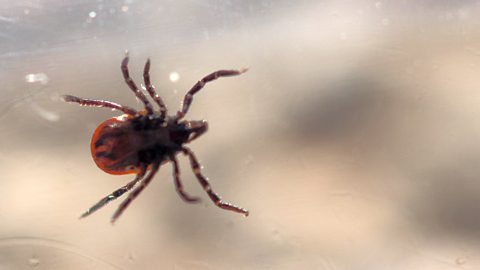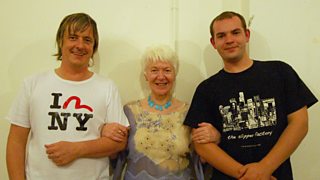How transplanting someone else’s poo into her gut helped a struggling world champion triathlete get her life back on track
25 July 2018
Lesley Paterson was one of the world’s best triathletes — a world championship winner.
But at the height of her powers she contracted the bacterial infection Lyme Disease; its debilitating symptoms threatened to derail her career.
It wasn’t until Lesley underwent a radical procedure to transplant someone else’s poo into her gut that she felt her health beginning to improve.

Faecal Microbial Transplant – Lesley Paterson
Triathlete Lesley Paterson had a Faecal Microbial Transplant to cure her Lyme’s disease
Professional triathlete Lesley was used to a gruelling six-hours-a-day training routine, but she was starting to struggle.
Her muscles ached more than usual and she was regularly nauseous. She started to question “am I going to be able to do it?” and became worried about letting down her sponsors.
A friend knew someone experiencing the same symptoms who was diagnosed with Lyme Disease. Lesley went for a check-up and in 2011 received the same diagnosis.
Reluctant to undertake a course of antibiotics – which has the potential to impact an athlete’s immune system – Lesley decided to undergo a radical treatment called a Faecal Microbial Transplant (FMT).
Faecal Microbial Transplant
Lesley described the treatment as one where you “take someone else’s poo, place it up your butt and adopt their microbiome” — in effect using their healthy bacteria to stimulate your own immune system.
When you go to the bathroom for the first time [after the treatment] you don’t smell like yourselfLesley Paterson
She noted that there are examples of animals feeding poo to their young to build up their immune systems. “When you’ve felt as bad as I’ve felt,” she added, “you’ll do anything to make yourself feel better.”
To the suggestion that she use a contribution from her husband, Lesley responded with an unequivocal “Hell no!”; her eventual donor remains safely anonymous.
In the days following the transplant, Lesley noticed an improved mood and increased energy levels. She was “able to exercise and not feel totally pooped ...for want of a better word!”
- Lesley’s interview in full on The Kaye Adams Programme (starts at 1hr 32m)
A (slightly sceptical) medical professional’s opinion
Dr Tom Smith – ����ý Radio Scotland’s resident GP – expressed concern about FMT being performed in an uncontrolled way or used to treat illnesses for which it isn’t yet certain the procedure will benefit.
He added that the donor cannot have taken antibiotics in the last year and must to be clear of diseases like HIV and hepatitis.
FMT should only be performed in proper clinics and is usually only be for people who have infections involving or caused by C. Difficile, a potentially fatal diarrhoea-inducing illness.
Dr Tom explained that he would have preferred to see Lesley take a course of antibiotics before attempting FMT, as this may have yielded similar results to the radical FMT procedure.

Transplanting faeces from one person to another: a radical solution for hospital superbug C. difficile

Professor Sheena Cruickshank on the effectiveness of faecal transplants on humans
How is Lyme Disease contracted?
Lyme Disease is transferred to humans when a tick bites an infected animal and then bites a human, spreading the disease into the human’s bloodstream.

How to spot the symptoms of Lyme disease
Dr Saleyha Ahsan demonstrates how to reduce the risk and spot the symptoms of Lyme disease
Tick bites: symptoms, prevention and further information
Symptoms of a tick bite can include: a rash that looks like a ‘bullseye’; flu-like symptoms; tingling and numbness in body parts; and (in severe cases) headaches.
Tick bites occur most frequently in woodland areas. The Highlands of Scotland are a particular hot spot.
The best ways to avoid tick bites are to wear socks to cover your lower legs, apply insect repellent and stick to paths rather than walking through the woods.
- Tick awareness events for South Uist
- Ignorance Lyme disease ‘costing lives’
- How dangerous are tick bites in the UK?
- (www.lymediseaseaction.org.uk)
- (www.gov.uk)
- (www.gov.uk)
Latest features from ����ý Scotland
-
![]()
'Wild swimming helps me process the grief of losing my son'
The benefits of cold water therapy.
-
![]()
Winter adventures are appealing, but an expert advises caution
Trips in winter require particular knowledge and skills.
-
![]()
The rescuers: Why volunteers risk their lives in mountain emergencies
Landward meets members of the Cairngorm Mountain Rescue Team.
-
![]()
‘Look for the light’ – practical tips to help you through another winter with SAD
Useful advice and tips to combat low moods at this time of year.
-
![]()
How you could be a binge drinker without even knowing
Binge drinking is classed as fewer units than many people may realise.
-
![]()
How chocolate biscuits and drama classes helped one man leave prison behind
The healing power of creativity.
-
![]()
'When people believe in you, it’s life-changing'
Author Graeme Armstrong revisits the man who helped turn his life around.
-
![]()
The 'breath-taking' display of US birds swept on to British soil
Recent storms have brought rare birds to our shores.
-
![]()
Six things we learned about Alan Cumming on Take the Floor (Spoiler: includes accordions)
The actor spoke to Take the Floor's Gary Innes.
-
![]()
How street gangs trap young men in a dangerous cycle of violence
The almost inescapable pull of life in a gang.
-
![]()
Why stylist Gok Wan believes there's no such thing as bad fashion
The fashion expert says we should stop following rules and do what feels right.
-
![]()
Is sending a CV still the right way to apply for a job?
They've been central to job applications for years, but are they worth it?















